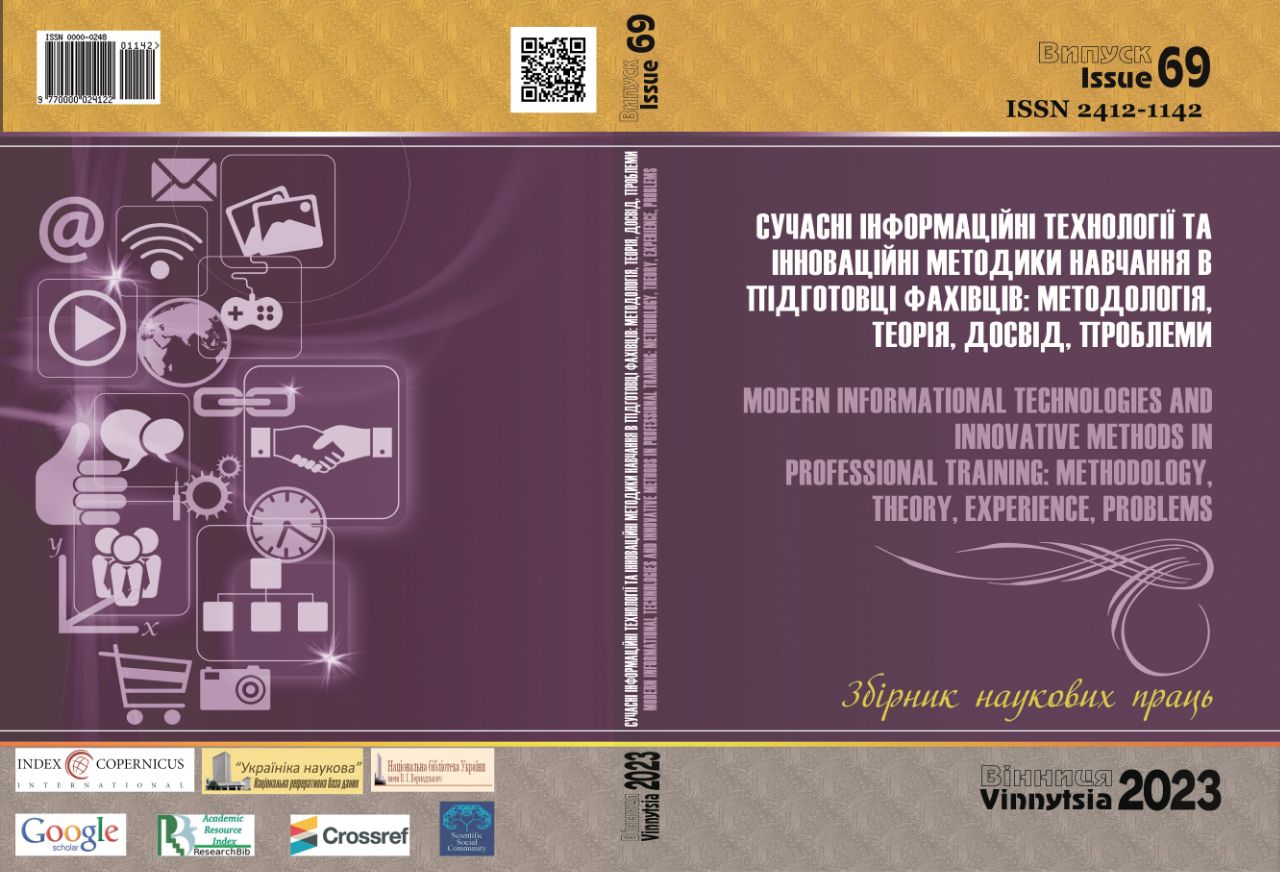EXPERIMENTAL AND SCIENTIFIC-METHODICAL WORK AS A FORM OF MATHEMATICS TEACHER'S SELF-EDUCATIONAL ACTIVITY
DOI:
https://doi.org/10.31652/2412-1142-2023-69-108-116Keywords:
scientific and methodical work of future teachers; self-education; training of future mathematics teachers; development of creative activity; modern school; quality of education; cognitive process; mathematical creativityAbstract
The article reveals the effectiveness of qualitative scientific and methodological work of future teachers at pedagogical universities, as an important component of a holistic educational and pedagogical process. Because future teachers should be able to implement the modern educational model in new conditions and with new methods at a new scientific and methodological level. A comprehensive system of actions and measures aimed at improving the qualifications and skills of teachers has been established. Here are described the basics of developing the theory and methodology of postgraduate self-education of a mathematics teacher and the creation of appropriate methodological support aimed at forming his intellectual competence and increasing professionalism. The first thing we decided on was the educational environment in which the self-education activity of the teacher should take place. Taking into account the fact that when developing the content and technologies of self-education, the main reference point is the components of the cognitive process in mathematics, it is natural that such an educational environment should be certain sections of mathematics, within which problems (problems) are solved that lead to the creation of a mathematical structure, if we are talking about internal research, so to speak, and before the construction of a mathematical model, if we are talking about application. The crown of such creation is a certain mathematical theory. The chosen strategic directions of mathematics development and the methods dominant in them became the methodological basis of the developed methods of self-education. Central among them is a technique based on the construction of mathematical objects in an accessible educational environment through the thematic legalization and technologization of methods. Such construction is carried out on two levels: - construction of an isomorphic model and development based on it by the method of transferring known facts to "new" objects of fragments of the theory (trigonometric functions associated with an oblique coordinate system, complex numbers, quaternions; – construction of new algebras of hypercomplex numbers. Also, the connection between methodical work, self-education of teachers and the development of research skills, creativity and creativity was analyzed. Three groups of methods of forming independent educational activities of future teachers are identified and described. The direction of the cognitive process in mathematics is established. Also, in the article you will learn how it is possible to improve the quality of education of students and the level of professional competence of teachers.
Downloads
References
Гончарова С. Ж. Методическая деятельность: сущность, проблемы, организация. Новокузнецк : ИПК.
72 с.
Столяренко А.М. Общая педагогика : учеб. пособ. для студентов вузов . М. : ЮНИТИ-ДАНА. 2006.
с.
Григораш В. Організація науково-методичної роботи в школі. Нова педагогічна думка. 2013. № 2.
С. 14-20.
Князян М. О. Самостійно-дослідницька робота як засіб підготовки студентів до розв'язання проблемних
ситуацій у професійній діяльності. Теорія та методика навчання та виховання. 2012. Вип. 31. С. 97-107.
Смагін І. І. Нормативний та педагогічний зміст поняття "науково-методична робота" в системі загальної
середньої освіти. Вісник Житомирського державного університету імені Івана Франка. 2012. Вип. 66.
С.52-55.
Уйсімбаєва Н. Самоосвітня діяльність майбутнього вчителя: теоретичний аспект. Наукові записки
Кіровоградського державного педагогічного університету імені Володимира Винниченка. Сер. :
педагогічні науки. 2014. Вип. 131. С. 204-208.
Томусяк А.А., Вотякова Л.А. Вивчення сучасного стану, розробка змісту та методичне забезпечення
професійного становлення учителя математики: наук. звіт по держбюджетній темі №103. Вінниця:
ВДПУ. 2005 р. 287 с.
Малихін О.В. Методичні рекомендації для формування у майбутніх учителів потреби в професійній
самоосвіті. Кривий Ріг: КДПУ. 2000. 24 с.
Сидорчук Н.Г. Технологія формування самоосвітніх умінь майбутніх учителів. Технології професійнопедагогічної підготовки майбутніх учителів: Навчальний посібник / За заг.ред. О.А.Дубасенюк.
Житомир: Житомир.держ.пед.ун-тет. 2001. С. 185-220.
Степанець І. О. Науково-методична робота у педагогічних ВНЗ на засадах компетентнісного підходу.
Наукові записки кафедри педагогіки. 2014. Вип. 37. С. 329-336.
Тищенко О. І. Самоосвітня діяльність вчителя як педагогічна проблема. Педагогіка формування творчої
особистості у вищій і загальноосвітній школах. 2016. Вип. 47. С. 159-163.
Невмержицька О. В. Самоосвіта вчителя як важлива форма методичної роботи в умовах становлення
інформаційного суспільства. Сучасні інформаційні технології та інноваційні методики навчання у
підготовці фахівців: методологія, теорія, досвід, проблеми. Київ—Вінниця, 2016. Вип. 46. С. 281-284.
Вотякова Л.А. До питання створення освітнього середовища, що забезпечує методологічну підготовку
учителя математики. Сучасні інформаційні технології та інноваційні методики навчання в підготовці
фахівців: методологія, теорія, досвід, проблеми. Збірник наукових праць. Випуск 16. Київ – Вінниця,
С.332-340.
Downloads
Published
Issue
Section
License
Copyright (c) 2023 Вотякова Леся Андріївна

This work is licensed under a Creative Commons Attribution 4.0 International License.

